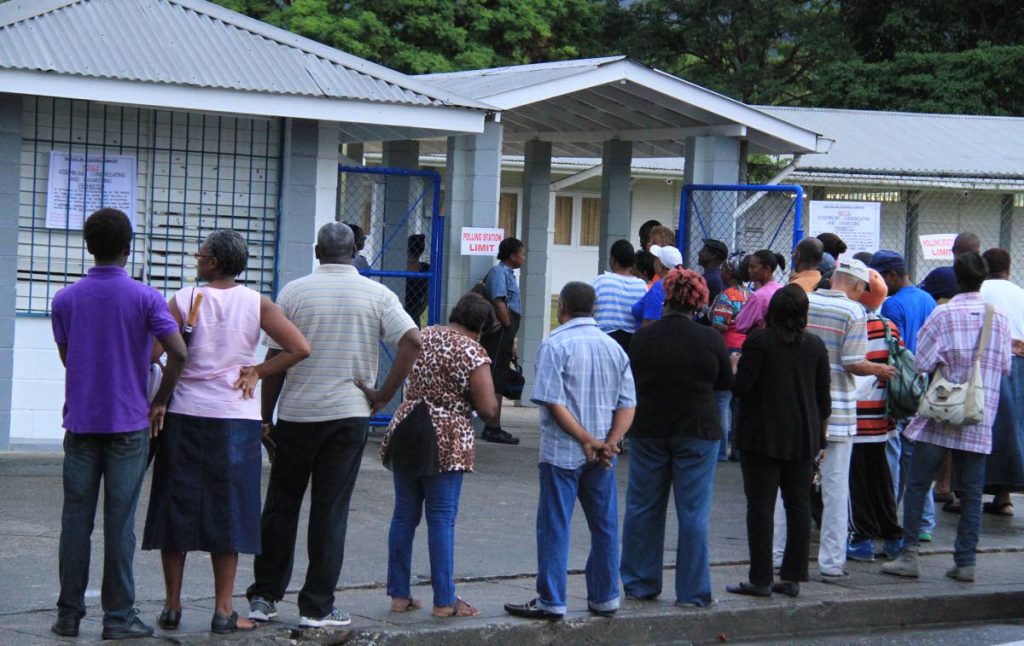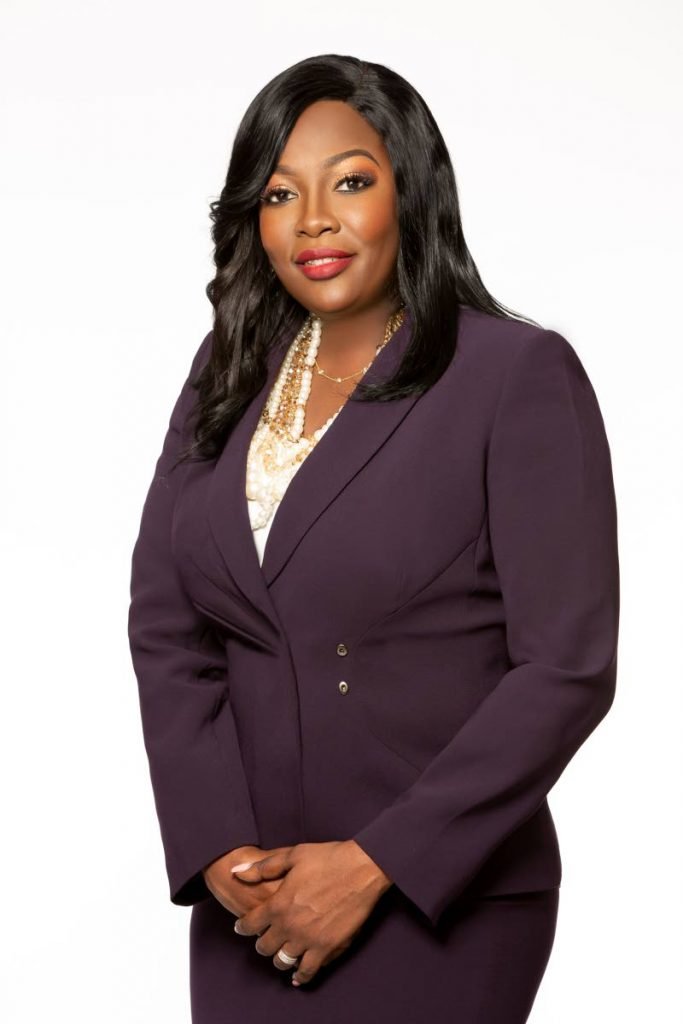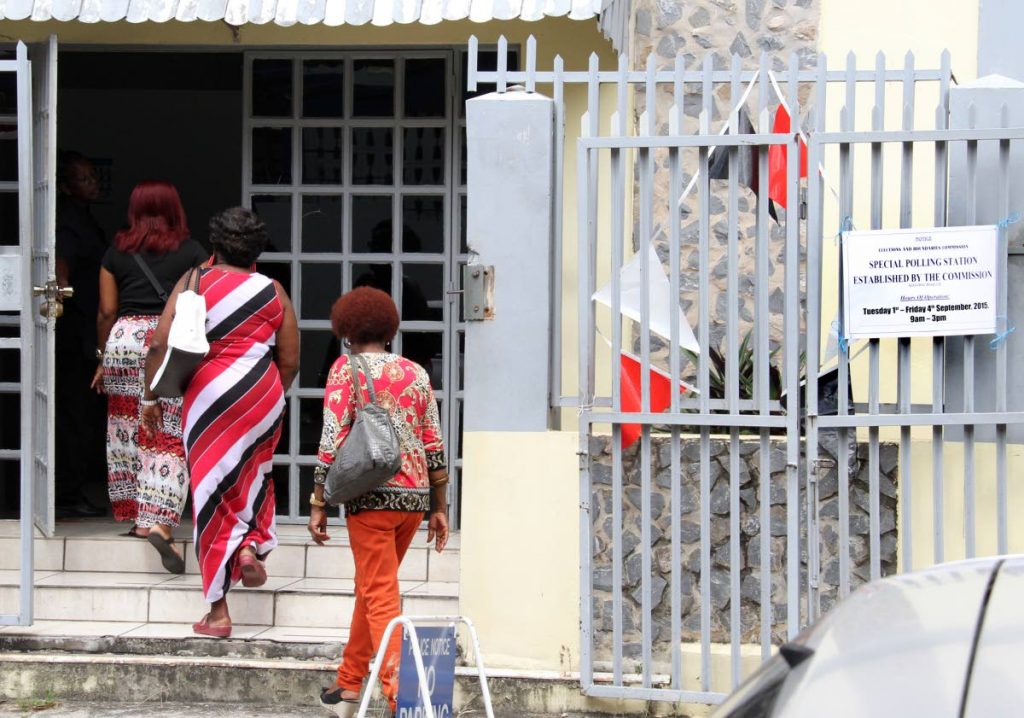Narcis-Scope: Modernising how people vote

Fern Narcis-Scope is the youngest person and the second woman to hold the post of Chief Election Officer (CEO) at the Elections and Boundaries Commission (EBC).
In addition to her relative youth and her gender, she is also not a traditional public officer, as she joined the public service as an attorney. So she has had to quickly learn how to manage and negotiate different aspects and nuances of the post. She is the second woman, after Jocelyn Lucas in the 1980s, to manage TT's electoral system.
Narcis-Scope was appointed to the board of commissioners in September 2017, so tomorrow's election will be her third, after by-elections in 2018 and local government elections in December 2019.
However, it is her first general election and next year’s Tobago House of Assembly elections will also be a first.
“It’s been a very busy few years since I took office,” she said laughingly.
Narcis-Scope said the organisation had to consider the various issues that emerge at every election to improve the process. Therefore, she initially considered the previous two elections as a dry run for the general election.
But: “Nothing could have prepared us for the covid19 pandemic. It has brought out a whole new dimension to election management and how we have to innovate.”
As the EBC’s youngest CEO, in her 40s, she had already taken the opportunity to try to make improvements to the organisation’s work. For example, under her direction the EBC website is being used more. It now contains information for political parties, candidates, and voters.
Applications for poll-day staff positions were available online. She said over half of the 40,000 people who applied did so online. In addition to the convenience, it greatly reduced the size of the crowd visiting the EBC’s office to collect application forms. Training videos have also been produced to give polling-day staff more consistent training throughout all electoral districts.
“So as I said, we've used the website in an innovative and new way, and I think future elections will see us continuing with some online initiatives. So there have been some positives coming out of covid19 for the organisation.”
Despite these advances, around every election, the staff at the EBC make a “tremendous amount” of effort and personal sacrifices, working long hours and sacrificing time with their families and friends.
She said they were dedicated to protecting and promoting democracy and should get medals for their work.
Making elections work
Narcis-Scope started work at the EBC in April 2010 as a senior legal officer, a post she held for seven years. She recalled that she had got the job but the start date was not yet settled when she heard from the chairman, the late Dr Norbert Masson. He asked if she could meet him at the EBC’s office immediately and when she got there, he asked if she could start work on the coming Monday because the prime minister, the late Patrick Manning, had called a snap election.

Chief Election Officer at the Elections and Boundaries Commission. -
“So I jumped in during election time and had to very quickly make myself au courant with the legislation.”
Since being elected she has made a number of contributions to the development of the organisation and, hopefully soon, legislation. She said she and Masson wrote a strategic plan for the organisation which the government approved in 2015. However, TT had election after election, so the organisation was not able to implement it.
As CEO, however, she has been able to make some inroads. For example, the organisation's boundaries section was revamped. A Boundaries Delimitation Unit was set up to make recommendations to the board on boundaries reports, and specialised contract positions were introduced for the use of more technology, especially geographic systems to collect data.
The EBC also identified the need to be certified by the International Organization for Standardization, and began working towards that. The process was delayed by covid19 but she hoped to resume it after the election.
She also contributed to draft amendments to the Representation of the People Act through the policy she wrote. She said it would be exciting to be part of the team to implement it if it became law.
“Certainly, from a personnel perspective, I was quite thrilled to see the amendments to the Representation of the People Act being laid in Parliament, just before the Parliament closed. That was, for me, a personal victory, because I spent a lot of time as senior legal officer working on suggestions, a policy document towards the registration of political parties and campaign finance reform.”
But so far, she 's most proud about the soon-to-be-launched identification card with improved security features.
“When it was first conceptualised, the ID card, in truth, really is a document for voting, but its use has evolved to be the main identification document in the country. So it has come a long way.”
She said the card is now necessary to apply for government and financial services and, with the police going to the EBC with cases of fraud as people attempted to replicate the ID cards, the EBC’s management and board members recognised their growing responsibility for identity management. They decided it was time to keep up with international best practices and ensure the card is as secure as possible.
Attorney to CEO
Before the EBC, Narcis-Scope worked as an attorney with several organisations, including the Central Bank, the National Maintenance Training and Security Company (MTS), the Ministry of Agriculture and in private practice doing corporate secretarial, public administration, and administrative law work.
“When I got called to the bar in 2004, I knew nothing about election management. This is not the career path I saw myself undertaking. I guess God led me here.
"When I came here in 2010 I don’t even think I intended to stay here as long as I have, but I really enjoyed discovering election management, not only from a legal perspective, but from a management perspective.”
She said election management had not part been of her purview, but it interested her, so she got involved and the board supported her interest. Since then she has travelled to a number of countries on election observer missions and for conferences.

But things have not been all positive. Narcis-Scope said while it is an interesting, exciting, and challenging field, the job was also very stressful. Fortunately she has been supported by her staff and the commissioners.
She said the nature of politics now is to attack the heads of organisations, so she has been the target of personal attacks from political parties. But she did not focus on it.
“When I decided, after discussing it with my family, that I would take the job, I knew what I was putting myself up for. But I felt that I had a responsibility, having succeeded in the interviews, to at least try to see what I could bring to the democracy at large in terms of how we could improve our processes moving forward.”
She added that TT’s society was now so litigious that she expected some legal action after the election.
“While you don’t want it, it seems now to be a growing part of the culture in relation to election management.
"So it could be that, after this is over, there could be an election petition or two that one would have to treat with. So it is not as simple as it used to be. But I am willing and I am ready. It’s part of the job now.”
Support has also come from her family.
She and her three siblings were raised to believe they could be and do anything. Her sister is a doctor, one brother got a master’s degree in information technology, and the other a PhD in biochemistry. They were raised to be confident and assertive and, although they had diverse interests, they were always close-knit.
She recalled the day she told her father about the CEO opportunity. He encouraged her to apply and, with absolute confidence, told her she would get it (he died a month after she got the job).
“While I may have had a few moments of trepidation, my family was all for it from day one.”
She said even now, when anything negative came her way, her mother, siblings, sisters-in-law, and her five-year-old daughter would “surround her like a warm blanket.” Without them, she said, the job would have been a lot harder.
Top women election officers
Narcis-Scope told Sunday Newsday she has never had challenges being a woman in her professional life. But at first her youth was an issue when she got the job as CEO. She said many of the people she had to supervise were older and had worked at the EBC for longer.
“You would find that in the beginning you have to be more assertive than you would necessarily like. But once people get to know you and understand your character, these issues quickly dwindle away.”
In addition to her upbringing at home, her alma mater, St Augustine Girls’ High School, prepared her for her leadership role at the EBC. Aside from academia, the school developed leaders in every sphere and industry. which was evident as many of her former classmates were in leadership roles in various organisations.
In addition, for the first time in TT’s history, the EBC is being run by women – CEO Narcis-Scope; deputy chief election officer Lena Champa Sahadeo; and acting assistant chief election officer Pamela Ogiste.
She said they complement each other and work very well together as they have different strengths. Narcis-Scope’s is the law, Sahadeo’s is information technology, and Ogiste’s is registration procedures.
She said with respect to the staff and staff engagement, women cared more.
“We understand that you can’t really contribute meaningfully to any organisation if an aspect of your life is a mess – whether personal, spiritual, or work. So we have tried to ensure, as best we could, that there is some sort of balance and make services like EAP available to staff. In this way they know if they have an issue there is some place they can turn.”
She believes that together they have brought a balance that has been positive for the organisation.
“The thing about women is, we can really do anything. We can multi-task in a way that our male counterparts cannot. We are wives, we are mothers, we are managers – and we have this gigantic task of managing elections.”


Comments
"Narcis-Scope: Modernising how people vote"